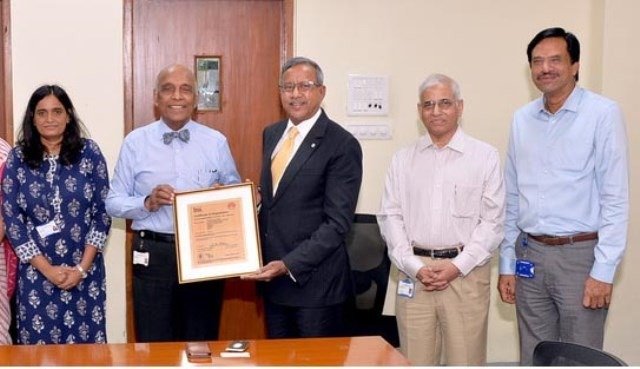
Hyderabad, September 11, 2019: LVPrasad Eye Institute (LVPEI), India’s leading research and teaching eye hospital, has received ISO 13485:2016 certification for the manufacture of BostonSight SCLERAL and PROSE (prosthetic replacement of the ocular surface ecosystem) lenses following review by the British Standards Institute (BSI). The new ISO certification ensures that the LVPEI’s quality management system meets current global regulatory requirements that are specific to the medical device industry.
Commenting on the occasion, Dr Gullapalli N Rao, Founder and Chair, L V Prasad Eye Institute said, “These special type of contact lenses offer the promise of relief for people afflicted with many problems of the cornea not treatable otherwise. We are delighted that we could make this service available in India.”
A commitment to quality is central to LVPEI’s vision of providing excellent and equitable eye care to all those in need. ISO 13485certification is a testament to LVPEI’s commitment and reflects rigorous and risk-based approach to development and commercialization.
The Boston Sight SCLERAL and PROSE lens manufacturing facility was establishedat LVPEI in 2017 in collaboration with Boston Foundation for Sight with an aim to increase the access of these specialized lenses to patients in underserved geographies. These lenses restore visual function, support healing, reduce symptoms, avoid corneal transplantation in some cases and improve quality of life for patients suffering with ocular surface disease, corneal disease, injury or damage.
The facility has served more than 1,500 patientsacross India and will soon start catering to patients in South-East and Middle-East Asia.
Mr. Venkataram Arabolu, Managing Director, BSI Group India said, “BSI is honoured to be the partner of choice and in helping LVPEI deliver global quality using systems. The humanitarian purpose of the organisation makes our service become even more important as we contribute in a small way to a much larger cause.”
Scleral lenses are commonly known for their use in patients with Stevens-Johnson syndrome, keratoconus, corneal grafts, chemical and thermal burn injuries, and ocular pemphigoid, among other uses. However, the increased spotlight on scleral lenses has led to their use in more number of patients with severe dry eyes due to Sjögren’s syndrome, autoimmune diseases, chronic graft-versus-host disease, post-LASIK dry eye, and irregular astigmatism.
About L V Prasad Eye Institute
The L V Prasad Eye Institute (LVPEI) was established in 1987 at Hyderabad as a not-for-profit, non-government, public-spirited, comprehensive eye care institution. LVPEI is governed by two trusts: the Hyderabad Eye Institute and the Hyderabad Eye Research Foundation. The Institute is a World Health Organization Collaborating Centre for Prevention of Blindness and a Global Resource Centre for VISION 2020: The Right to Sight initiative. LVPEI has ten active arms to its areas of operations: Clinical Services, Education, Research, Vision Rehabilitation, Rural and Community Eye Health, Eye Banking, Advocacy and Policy Planning, Capacity Building, Innovation and Product Development.
The LVPEI pyramidal model of eye care delivery currently includes a Centre of Excellence in Hyderabad, 3 tertiary centres in Bhubaneswar, Visakhapatnam and Vijayawada, 19 secondary and 180 primary care vision centres that cover the remotest rural areas in the four states of Telangana, Andhra Pradesh, Odisha and Karnataka. Website: www.lvpei.org